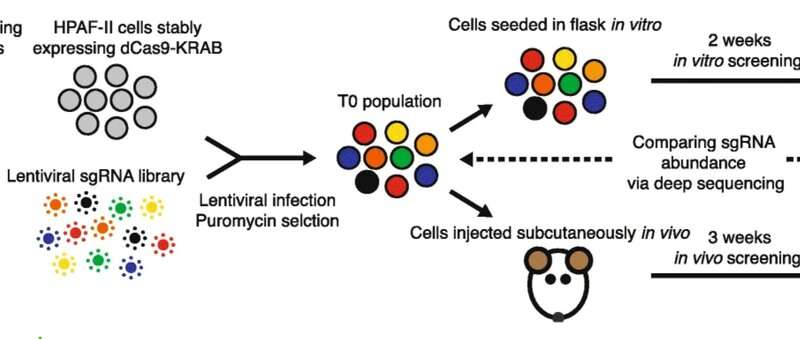#Shining a light on the role of the genome’s ‘dark matter’ in cancer development

“#Shining a light on the role of the genome’s ‘dark matter’ in cancer development”

Long RNA molecules carrying DNA codes that aren’t translated into proteins have long been a mystery of the human genome. Now, scientists at Duke-NUS Medical School have found a way to systematically investigate their functions and discovered some could play a role in pancreatic cancer. Their findings, published in the journal Genome Medicine, highlight the importance of investigating long non-coding RNAs (lncRNAs) in living organisms.
RNA had long been considered an intermediary molecule; DNA codes for RNA, which, in turn, codes for protein. More recently, scientists found that of the three billion base pairs in the human genome, only 2% encode proteins. Much of the remaining 98% of the genome is non-coding, and once thought to be the dark matter of the human genome, with no known functions. Some lncRNAs, a major component of this genomic dark matter, have been shown to play key roles in diverse biological processes ranging from development to diseases.
“By combining several advanced tools, we were able to investigate the role and function of ‘the dark matter that matters’ in pancreatic cancer,” said the study’s lead author, Mr Shiyang Liu, who is an MD/Ph.D. student at Duke-NUS.
Specifically, the research team wanted to identify lncRNAs that were regulated by a well-known pathway called Wnt signaling. This pathway regulates many genes that code for proteins, but its influence on lncRNAs has been unclear.
Wnt signaling is known to fuel the growth of some pancreatic cancers. Turning off this pathway could not only help treat pancreatic cancer but also help researchers identify the parts of the genome that are regulated by it.
To do this, the research team turned to ETC-159, a made-in-Singapore Wnt-suppressing drug jointly developed by Duke-NUS and the Agency for Science, Technology and Research (A*STAR), which is currently progressing through clinical trials as a treatment for a range of cancers, including pancreatic.
The scientists compared what happened to lncRNAs when ETC-159 turned off Wnt signaling in a preclinical model of pancreatic cancer and in pancreatic cancer cells cultured in the laboratory. They found it changed the expression of 1,503 lncRNAs in the former but only changed the expression of half that number in the latter. This highlights the importance of studying lncRNAs within the context of a more natural environment, the researchers say.
Associate Professor Enrico Petretto, from Duke-NUS’ Cardiovascular and Metabolic Disorders Program, a senior co-author of the study, explained, “Compared with previous studies we identified twice as many lncRNAs in vivo than what you might detect in vitro, and many of these are important for cancer cell growth only in vivo, providing important clues for the development of more effective cancer treatments.”
The team then used the gene editing tool CRISPR to study what happened when the 1,503 Wnt-regulated lncRNAs were turned off in the preclinical model and in the pancreatic cell cultures. Twenty-one lncRNAs were found to be able to modify pancreatic cancer cell growth in the living model, whereas only half that number were identified in the cancer cell culture tests.
“Our study provides a unique window in the largely unknown role of the dark matter of the genome that plays a functional role in pancreatic cancer, and will be a valuable resource for the scientific community studying Wnt-regulated lncRNAs in cancer,” said Professor David Virshup, director of Duke-NUS’ Cancer and Stem Cell Biology Program, and also a senior co-author of the study. Prof Virshup’s seminal research on Wnts led to the development of ETC-159. “Understanding that a subset of Wnt-regulated lncRNAs can act as mediators of the oncogenic function of Wnt signaling in cancers provides potential new targets for precision cancer therapies.”
The research team called for further studies to understand how these Wnt-regulated lncRNAs regulate cancer cell proliferation.
Researchers discover specific molecules that promote cancer progression
Shiyang Liu et al. Wnt-regulated lncRNA discovery enhanced by in vivo identification and CRISPRi functional validation, Genome Medicine (2020). DOI: 10.1186/s13073-020-00788-5
Citation:
Shining a light on the role of the genome’s ‘dark matter’ in cancer development (2020, November 4)
retrieved 4 November 2020
from https://medicalxpress.com/news/2020-11-role-genome-dark-cancer.html
This document is subject to copyright. Apart from any fair dealing for the purpose of private study or research, no
part may be reproduced without the written permission. The content is provided for information purposes only.
For forums sites go to Forum.BuradaBiliyorum.Com
If you want to read more Like this articles, you can visit our Science category.



